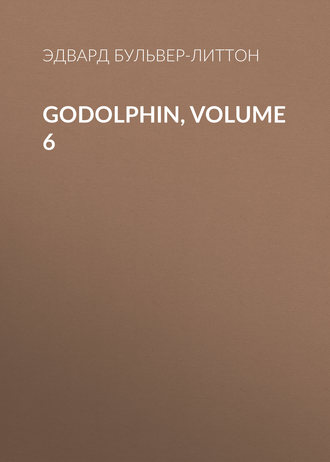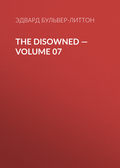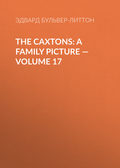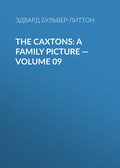
Эдвард Бульвер-Литтон
Godolphin, Volume 6
CHAPTER LXV
NEW VIEWS OF A PRIVILEGED ORDER.—THE DEATH-BED OF AUGUSTUS SAVILLE
This event might indeed have been an era in the life of Percy Godolphin, had that life been spared to a more extended limit than it was; and yet, so long had his ambition been smoothed and polished away by his peculiarities of thought, and so little was his calm and indifferent tone of mind suited to the hot contests and nightly warfare of parliamentary politics, that it is not probable he would ever have won a continuous and solid distinction in a career which requires either obtuseness of mind or enthusiasm of purpose to encounter the repeated mortifications and failures which the most brilliant debutant ordinarily endures. As it was, however, it produced a grave and solemn train of thought in Godolphin's breast. He mused much over his past life, and the musing did not satisfy him. He felt like one of those recorded in physiological history who have been in a trance for years: and now slowly awakening, he acknowledged the stir and rush of revived but confused emotions. Nature, perhaps, had intended Godolphin for a poet; for, with the exception of the love of glory, the poetical characteristics were rife within him; and over his whole past existence the dimness of unexpressed poetical sensation had clung and hovered. It was this which had deadened his soul to the active world, and wrapped him in the land of dreams; it was this which had induced that vague and restless dissatisfaction with the Actual which had brought the thirst for the Ideal; it was this which had made him fastidious in love, repining in pleasure, magnificent in luxury, seeking and despising all things in the same breath. There are many, perhaps, of this sort, who, having the poet's nature, have never found the poet's vent to his emotions; have wandered over the visionary world without chancing to discover the magic wand that was stored within the dark chamber of their mind, and would have reduced the visions into shape and substance. Alas! what existence can be more unfulfilled than that of one who has the soul of the poet and not the skill? who has the susceptibility and the craving, not the consolation or the reward?
But if this cloud of dreamlike emotion had so long hung over Godolphin, it began now to melt away from his heart; a clearer and distincter view of the large objects of life lay before him; and he felt that he was standing, half stunned and passive, in the great crisis of his fate.
The day was now fixed for their departure to Wendover, when Saville was taken alarmingly ill; Godolphin was sent for, late one evening. He found the soi-disant Epicurean at the point of death, but in perfect possession of his senses. The scene around him was emblematic of his life: save Godolphin, not a friend was by. Saville had some dozen or two of natural children—where were they? He had abandoned them to their fate: he knew not of their existence, nor they of his death. Lonely in his selfishness was he left to breathe out the small soul of a man of bon-ton! But I must do Saville the justice to say, that if he was without the mourners and the attendants that belonged to natural ties, he did not require them. His was no whimpering exit from life: the champagne was drained to the last drop; and Death, like the true boon companion, was about to shatter the empty glass.
"Well, my friend," said Saville, feebly, but pressing with weak fingers Godolphin's hand—"well, the game is up, the lights are going out, and presently the last guest will depart, and all be darkness!" here the doctor came to the bedside with a cordial. The dying man, before he took it, fixed upon the leech an eye which, although fast glazing, still retained something of its keen, searching shrewdness.
"Now tell me, my good sir, how many hours more can you keep in this—this breath?"
The doctor looked at Godolphin.
"I understand you," said Saville; you are shy on these points. Never be shy, my good fellow; it is inexcusable after twenty: besides, it is a bad compliment to my nerves—a gentleman is prepared for every event. Sir, it is only a roturier whom death, or anything else, takes by surprise. How many hours, then, can I live?"
"Not many, I fear, sir: perhaps until daybreak."
"My day breaks about twelve o'clock, p.m.," said Saville, as drily as his gasps would let him. "Very well;—give me the cordial;—don't let me go to sleep—I don't want to be cheated out of a minute. So, so—! I am better. You may withdraw, doctor. Let my spaniel come up. Bustle, Bustle!—poor fellow! poor fellow! Lie down, sir! be quiet! And now, Godolphin, a few words in farewell. I always liked you greatly; you know you were my protege, and you have turned out well. You have not been led away by the vulgar passions of politics, and place, and power. You have had power over power itself; you have not office, but you have fashion. You have made the greatest match in England; very prudently not marrying Constance Vernon, very prudently marrying Lady Erpingham. You are at the head and front of society; you have excellent taste, and spend your wealth properly. All this must make your conscience clear—a wonderful consolation! Always keep a sound conscience; it is a great blessing on one's death-bed—it is a great blessing tome in this hour, for I have played my part decently—eh?—I have enjoyed life, as much as so dull a possession can be enjoyed; I have loved, gamed, drunk, but I have never lost my character as a gentleman: thank Heaven, I have no remorse of that sort! Follow my example to the last and you will die as easily. I have left you my correspondence and my journal; you may publish them if you like; if not, burn them. They are full of amusing anecdotes; but I don't care for fame, as you well know—especially posthumous fame. Do as you please then, with my literary remains. Take care of my dog—'tis a good creature; and let me be quietly buried. No bad taste—no ostentation—no epitaph. I am very glad I die before the d—d Revolution that must come; I don't want to take wine with the Member for Holborn Bars. I am a type of a system; I expire before the system; my death is the herald of its fall."
With these expressions—not continuously uttered, but at short intervals—Saville turned away his face: his breathing became thick: he fell into the slumber he had deprecated; and, after about an hour's silence, died away as insensibly as an infant. Sic transit glories mundi!
The first living countenance beside the death-bed on which Godolphin's eye fell was that of Fanny Millinger; she (who had been much with Saville during his latter days, for her talk amused him, and her good-nature made her willing to amuse any one) had been, at his request, summoned also with Godolphin at the sudden turn of his disease. She was at the theatre at the time, and had only just arrived when the deceased had fallen into his last sleep. There, silent and shocked, she stood by the bed, opposite Godolphin. She had not stayed to change her stage-dress; and the tinsel and mock jewels glittered on the revolted eye of her quondam lover. What a type of the life just extinguished! What a satire on its mountebank artificialities!
Some little time after, she joined Godolphin in the desolate apartment below. She put her hand in his, and her tears—for she wept easily—flowed fast down her cheeks, washing away the lavish rouge which imperfectly masked the wrinkles that Time had lately begun to sow on a surface Godolphin had remembered so fair and smooth.
"Poor Saville!" said she, falteringly; "he died without a pang. Ah! he had the best temper possible."
Godolphin sat by the writing-table of the deceased, shading his brow with the hand which the actress left disengaged.
"Fanny," said he, bitterly, after a pause, "the world is indeed a stage.
It has lost a consummate actor, though in a small part."
The saying was wrung from Godolphin—and was not said unkindly, though it seemed so—for he too had tears in his eyes.
"Ah," said she, the play-house has indeed taught us, in our youth, many things which the real world could not teach us better."
"Life differs from the play only in this," said Godolphin, some time afterwards; "it has no plot—all is vague, desultory, unconnected—till the curtain drops with the mystery unsolved."
Those were the last words that Godolphin ever addressed to the actress.
CHAPTER LXVI
THE JOURNEY AND THE SURPRISE.—A WALK IN THE SUMMER NIGHT.—THE STARS AND THE ASSOCIATION THAT MEMORY MAKES WITH NATURE
This event detained Godolphin some days longer in town. He saw the last rites performed to Saville, and he was present at the opening of the will.
As in life Saville had never lent a helping hand to the distressed, as he had mixed with the wealthy only, so now to the wealthy only was his wealth devoted. The rich Godolphin was his principal heir; not a word was even said about his illegitimate children, not an inquiry ordained towards his poor relations. In this, as in all the formula of his will, Saville followed the prescribed customs of the world.
Fast went the panting steeds that bore Constance and Godolphin from the desolate city. Bright was the summer sky, and green looked the smiling fields that lay on either side their road. Nature was awake and active. What a delicious contrast to the scenes of Art which they left behind! Constance exerted herself to the utmost to cheer the spirits of her companion, and succeeded. In the small compass which confined them together, their conversation flowed in confidence and intimate affection. Not since the first month of their union had they talked with less reserve and more entire love—only there was this difference in their topics they then talked of the future only, they now talked more of the past. They uttered many a fond regret over their several faults to each other; and, with clasped hands, congratulated themselves on their present reunion of heart. They allowed how much all things independent of affection had deceived them, and no longer exacting so much from love, they felt its real importance. Ah, why do all of us lose so many years in searching after happiness, but never inquiring into its nature! We are like one who collects the books of a thousand tongues, and knowing not their language, wonders why they do not delight him?
But still, athwart the mind of Constance one dark image would ever and anon obtrude itself; the solitary and mystic Lucilla, with her erring brain and forlorn fortunes, was not even in happiness to be forgotten. There were times, too, in that short journey, when she felt the tale of her interview with that unhappy being rise to her lips: but ever when she looked on the countenance of Godolphin, beaming with more heartfelt and homeborn gladness than she had seen for years, she could not bear the thought of seeing it darkened by the pain her story would inflict; and she shrank from embittering moments so precious to her heart.
All her endeavours to discover Lucilla had been in vain: but an unquiet presentiment that at any moment that discovery might be made, perhaps in the presence of Godolphin, constantly haunted her, and she even now looked painfully forth at each inn where they changed horses, lest the sad, stern features of the soothsayer should appear, and break that spell of happy quiet which now lay over the spirit of Godolphin.
It was towards the evening that their carriage slowly wound up a steep and long ascent. The sun yet wanted an hour to its setting; and at their right, its slant and mellowed beams fell over rich fields, green with the prodigal luxuriance of June, and intersected by hedges from which, proud and frequent, the oak and elm threw forth their lengthened shadows. On their left the grass less fertile, and the spaces less inclosed, were whitened with flocks of sheep; and far and soft came the bleating of the lambs upon their ear. They saw not the shepherd nor any living form; but from between the thicker groups of trees the chimneys of peaceful cottages peered forth, and gave to the pastoral serenity of the scene that still and tranquil aspect of life which alone suited it. The busy wheel in the heart of Constance was at rest, and Godolphin's soul, steeped in the luxury of the present hour, felt that delicious happiness which would be heaven could it outlive the hour.
"My Constance," whispered he, "why, since we return at last to these scenes, why should we ever leave them? Amidst them let us recall our youth!" Constance sighed, but with pleasure, and pressed Godolphin's hand to her lips.
And now they had gained the hill, a sudden colour flushed over Godolphin's cheek.
"Surely," said he, "I remember this view. Yonder valley! This is not the road to Wendover Castle; this—my father's home!—the same, and not the same!"
Yes! Below, basking in the western light, lay the cottage in which Godolphin's childhood had been passed. There was the stream rippling merrily; there the broken and fern-clad turf, with "its old hereditary trees;" but the ruins!—the shattered arch, the mouldering tower, were left indeed—but new arches, new turrets had arisen, and so dexterously blended with the whole that Godolphin might have fancied the hall of his forefathers restored—not indeed in the same vast proportions and cumbrous grandeur as of old, but still alike in shape and outline, and such even in size as would have contented the proud heart of its last owner. Godolphin's eyes turned inquiringly to Constance.
"It should have been more consistent with its ancient dimensions," said she; "but then it would have taken half our lives to have built it."
"But this must have been the work of years."
"It was."
"And your work, Constance?"
"For you."
"And it was for this that you hesitated when I asked you to consent to raising the money for the purchase of Lord –'s collection?"
"Yes;—am I forgiven?"
"Dearest Constance," said Godolphin, flinging his arms around her, "how have I wronged you! During those very years, then, of our estrangement—during those very years in which I thought you indifferent, you were silently preparing this noble revenge on the injury I did you. Why, why did I not know this before? Why did you not save us both from so long a misunderstanding of each other?"
"Dearest Percy, I was to blame; but I always looked to this hour as to a pleasure of which I could not bear to rob myself. I always fancied that when this task was finished, and you could witness it, you would feel how uppermost you always were in my thoughts, and forgive me many faults from that consideration. I knew that I was executing your father's great wish; I knew that you always, although unconsciously, perhaps, sympathised in that wish. I only grieve that, as yet, it has been executed so imperfectly."
"But how," continued Godolphin, gazing on the new pile as they now neared the entrance, "how was it this never reached my ears through other quarters?"
"But it did, Percy; don't you remember our country neighbour, Dartmour, complimenting you on your intended improvements, and you fancied it was irony, and turned your back on the discomfited squire?"
They now drove under the gates surmounted with Godolphin's arms; and in a few minutes more, they were within the renovated halls of the Priory.
Perhaps it was impossible for Constance to have more sensibly touched and flattered Godolphin than by this surprise; it affected him far more than the political concession which to her had been so profound a sacrifice; for his early poverty had produced in him somewhat of that ancestral pride which the poor only can gracefully wear; and although the tie between his father and himself had not possessed much endearment, yet he had often, with the generosity that belonged to him, regretted that his parent had not survived to share in his present wealth, and to devote some portion of it to the realisation of those wishes which he had never been permitted to consummate. Godolphin, too, was precisely of a nature to appreciate the delicacy of Constance's conduct, and to be deeply penetrated by the thought that, while he was following a career so separate from hers, she, in the midst of all her ambitious projects, could pause to labour, unthanked and in concealment, for the delight of this hour's gratification to him: the delicacy and the forethought affected him the more, because they made not a part of the ordinary character of the high and absorbed ambition of Constance. He did not thank her much by words, but his looks betrayed all he felt, and Constance was overpaid.
Although the new portion of the building was necessarily not extensive, yet each chamber was of those grand proportions which suited the magnificent taste of Godolphin, and harmonised with the ancient ruins. Constance had shown her tact by leaving the ruins themselves (which it was profane to touch) unrestored; but so artfully were those connected with the modern addition, and thence with the apartments in the cottage, which she had not scrupled to remodel, that an effect was produced from the whole far more splendid than many Gothic buildings of greater extent and higher pretensions can afford. Godolphin wandered delightedly over the whole, charmed with the taste and judgment which presided over even the nicest arrangement.
"Why, where," said he, struck with the accurate antiquity of some of the details, "where learned you all these minutiae? You are as wise as Hope himself upon cornices and tables."
"I was forced to leave these things to others," answered Constance; "but I took care that they possessed the necessary science."
The night was exceedingly beautiful, and they walked forth under the summer moon among those grounds in which Constance had first seen Godolphin. They stood by the very rivulet—they paused at the very spot! On the murmuring bosom of the wave floated many a water-flower; and now and then a sudden splash, a sudden circle in the shallow stream, denoted the leap of the river-tyrant on his prey. There was a universal odor in the soft air; that delicate, that ineffable fragrance belonging to those midsummer nights which the rich English poetry might well people with Oberon and his fairies; the bat wheeled in many a ring along the air; but the gentle light bathed all things, and robbed his wanderings of the gloomier associations that belong to them; and ever, and ever, the busy moth darted to and fro among the flowers, or misled upwards by the stars whose beam allured it, wandered, like Desire after Happiness, in search of that light it might never reach. And those stars still, with their soft, unspeakable eyes of love, looked down upon Godolphin as of old, when, by the Italian lake, he roved with her for whom he had become the world itself. No, not now, nor ever, could he gaze upon those wan, mysterious orbs, and not feel the pang that reminded him of Lucilla! Between them and her was an affinity which his imagination could not sever. All whom we have loved have something in nature especially devoted to their memory; a peculiar flower, a breath of air, a leaf, a tone. What love is without some such association.
"Striking the electric chain wherewith we're bound"?
But the dim, and shadowy, and solemn stars were indeed meet remembrancers of Volktman's wild daughter; and so intimately was their light connected in Godolphin's breast with that one image, that their very softness had, to his eyes, something fearful and menacing—although as in sadness, not in anger.







